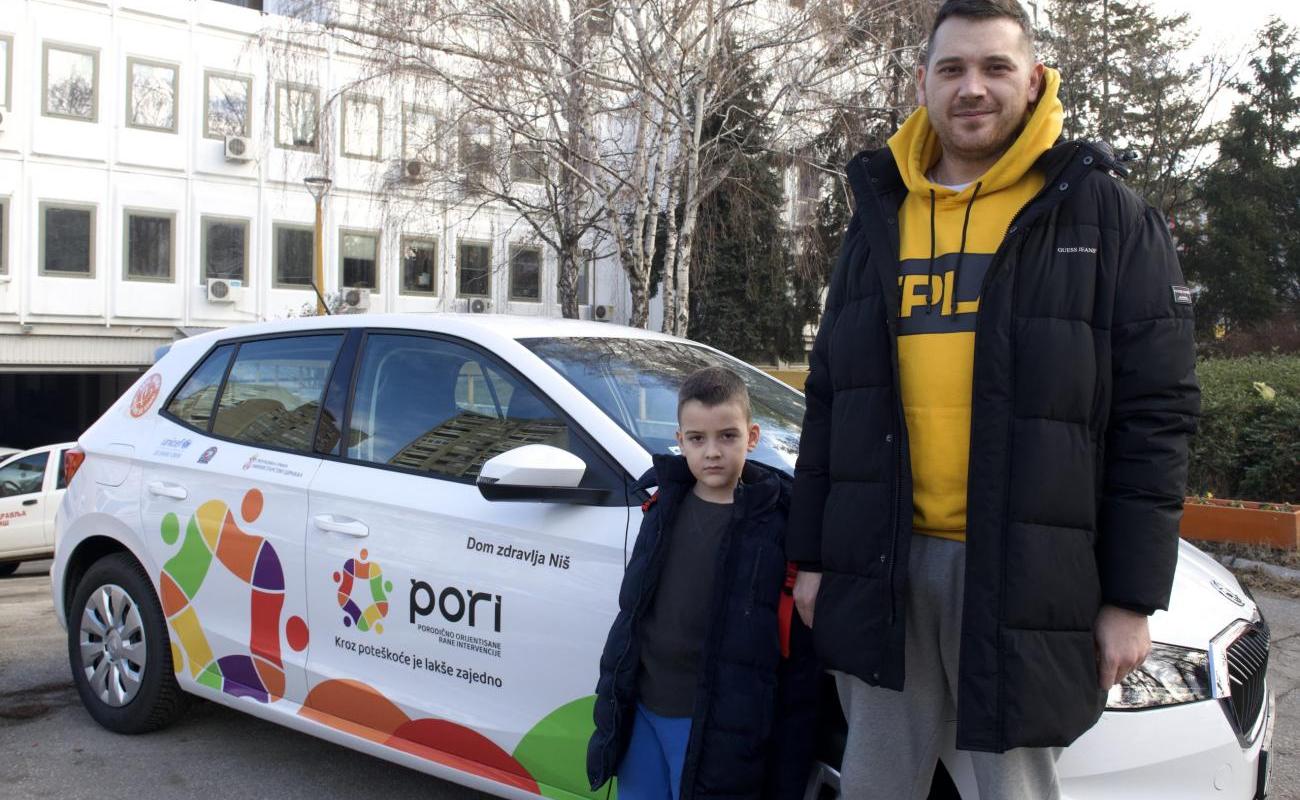UNICEF Donates Vehicle to the Developmental Counselling Unit in Nis to Support Families of Children with Developmental Difficulties

The Developmental Counselling Unit at the Nis Primary Health Centre today received a vehicle designed for home visits to families of children with developmental difficulties and disabilities. This vehicle will facilitate the provision of family-oriented early interventions (PORI) in family homes, ensuring access to key services, particularly for families in smaller communities around Nis.
The donation is part of UNICEF's longstanding partnership with the Ministry of Health and the Nis Primary Health Centre, which has been ongoing since 2014, aimed at improving the early development of children and supporting their families.
Dr Milorad Jerkan, Director of the Nis Primary Health Centre, highlighted the importance of this donation for the Developmental Counselling Unit, which serves approximately 15,000–20,000 children under six years of age from Nis and municipalities in the Nisava District. Among these, around 5,000–5,500 children annually receive services from the Unit due to developmental risks, difficulties, and disabilities.
“The Developmental Counselling Unit in Nis has been working with UNICEF for decades to provide the best possible support to families from Nis and surrounding municipalities. Today, Nis and our Unit serve as a model of good practice in the country. The donation of this vehicle enables our experts to respond more efficiently to the needs of children with developmental difficulties and disabilities and to ensure that every child under six with developmental challenges, even in remote areas around Nis, gains access to services crucial for their development,” stated Dr Milorad Jerkan.
According to estimates from the Ministry of Health, there are approximately 60,000 children under six years old in Serbia with developmental risks and disabilities who require such services for support in development and inclusion. At the end of 2024, the Ministry adopted regulatory changes, making developmental screening, comprehensive team assessments, home visits, fieldwork, video consultations, and other components of early intervention services part of the systemic support offered by developmental counselling units and PORI teams nationwide.
“Our health centres, paediatricians, nurses, and healthcare associates are the cornerstone of this support. Aligning regulations and improving working conditions to enable them to provide the best quality care for children and their families is our priority. Developmental counselling units allow this support to reach the most vulnerable children, including those with developmental difficulties and disabilities. That is why I am especially pleased that through our partnership with UNICEF, we are able to establish and strengthen them across the country. The goal is for every district to have at least one developmental counselling unit capable of supporting all families in that district,” said Prof. Dr Nebojsa Tasix, an advisor at the Ministry of Health.
Jelena Petkovic, Coordinator of the Developmental Counselling Unit and the PORI team, emphasised the importance of continuous support for families.
“With the support of UNICEF and the Ministry of Health, we are further strengthening our professional and institutional capacities, providing support to families in line with European and global standards. Collaboration with preschool institutions and social work centres in a unified team of professionals, known as the PORI team, allows us to increase our reach, support more families, and coordinate assistance across all sectors. With this vehicle, we will be even closer to families and children, providing them with support exactly where they need it – in their homes and preschools,” said Jelena Petkovic.
To date, the PORI programme has included over 4,000 children with developmental difficulties and disabilities and their families. The aim is for this good practice to reach every family of a child with developmental challenges.
“Parents of children with developmental difficulties face numerous challenges from their child’s earliest age. Providing early support significantly helps them adapt to new circumstances and organise their lives so that every moment becomes an opportunity for learning and development. The skills required for this different style of parenting are not simple, but with continuous support from professionals, they can be mastered to the benefit and satisfaction of both the child and us as parents,” said Biljana Stojanovic, a representative of the DAN Association of Parents of Children with Autism, Other Difficulties and Disabilities.
In recent years, UNICEF and the Ministry of Health have enhanced the capacities of primary health centres and developmental counselling units in 15 of Serbia’s 25 districts, and in 2025, six more were included.
Jelena Zajeganovic Jakovljevic, UNICEF’s Health and Early Childhood Development Specialist, underlined the importance of partnerships in investing in the earliest years of a child’s life.
“Investing in early childhood development is the most profitable investment for the future of society. I thank our donors, both individuals and the business sector, who are working with us to ensure that every child, regardless of where they live, has access to essential services for early development. We will continue working to expand the network of early intervention services and to ensure their sustainability and quality. We are proud of the results of the Developmental Counselling Unit and the PORI team in Nis, whose knowledge and capacities are comparable to those in many European countries,” noted Dr Jelena Zajeganovic Jakovljevic.
In recent years, UNICEF, through successful donor campaigns, has supported the training of professionals, equipping counselling units with digital tools, teaching materials, and assistive technology, thus enhancing the support system for children and families in the most vulnerable groups.
